
After the Nov. 4 midterm elections, the Pennsylvania state government and the federal government now look quite similar: a Democrat in the executive branch and a Republican-controlled legislature, both fighting for their legislative objectives.
Pennsylvania Governor-elect Tom Wolf, a Democrat, won by nearly 10 points in an election year that proved very favorable for Republicans. In the Pennsylvania legislature, Republicans picked up eight seats in the Pennsylvania State House and three seats in State Senate, solidifying conservative control of both chambers.
With a new balance of power also comes new leaders. On Nov. 12, Republicans elected Rep. Mike Turzai (R-Allegheny County) as the new Speaker of the State House and Sen. Jake Corman (R-Centre County) as State Senate majority leader.
“What we have going on in Pennsylvania was an election that was part of the national wave,” said Terry Madonna , director of Franklin and Marshall College’s Center for Politics and Public Affairs . “But secondly, it was also a rejection of the incumbency of Tom Corbett, which puts it clearly in a different realm then what we saw in different states.”
In addition to gaining control of the U.S. Senate and picking up seats in the House of Representatives, Republicans nationwide increased their share of governorships. Most surprisingly, Republicans won governorships in several Democratic states, such as Maine, Maryland and Illinois. Wolf’s election stands as one of the only outliers.
Nonetheless, some hope that compromise and cooperation have a better chance in Pennsylvania than in the capital.
“I think with our governor-elect, Republicans in our House and Senate will see, for a change, a governor who is willing to talk to everyone,” Pennsylvania Democratic Party Chairman Jim Burn said. “This governor will talk to everyone about a commonsense approach and a business-like approach to running this state ... but I believe that they will be able to at least sit at a table and find a common ground on issues, and where they disagree, they are going to have to work a little harder.”
While Democrats remain optimistic that Wolf will be successful in moving legislation through the state legislature, others are not as sure.
“Wolf, who has an ambitious agenda, will now have a tough time with a more conservative legislature, both in the House and in the Senate,” Madonna said. “It’s going to be a really tough task.”
“Corbett couldn’t even really get a conservative agenda through the legislature and couldn’t even get his pension bill out of the House, which is a very conservative chamber,” he added.
On the other side of the aisle, Republicans say they want to meet the Democrats halfway, but both parties have yet to outline how bipartisanship could take place.
“Throughout the course of the election, Governor-elect Wolf wasn’t very clear on his policy positions on some issues and Republican leaders were very clear,” Communications Director for the Republican Party of Pennsylvania Megan Sweeney said. “But I’m sure as Governor-elect Wolf wants to work with and learn about those positions, he is certainly welcome and encouraged to meet with those leaders.”
The possibility of gridlock in both Harrisburg and Washington persists because of continued polarization. According to a study conducted by Pew Research Center this summer, both parties are not on the same political page: 92 percent of Republicans are more conservative than the median Democrat, whereas 94 percent of Democrats are more liberal than the median Republican.
For Penn, gridlock in the state and national legislatures could halt some of its legislative goals, such as continued funding for Penn Vet, immigration reform and patent reform.
Penn’s lobbying arm — the Office of Government and Community Affairs — declined to speak about how specific election results will affects its agenda, but expressed its continued effort to sway legislatures on behalf of Penn’s interests.
“Leadership changes at the national and state levels create new opportunities for promoting important initiatives such as Penn’s efforts to increase access to higher education, affordability and job-creating innovation agenda,” Executive Director Dawn Maglicco Deitch said in a statement.
The Daily Pennsylvanian is an independent, student-run newspaper. Please consider making a donation to support the coverage that shapes the University. Your generosity ensures a future of strong journalism at Penn.
DonatePlease note All comments are eligible for publication in The Daily Pennsylvanian.




